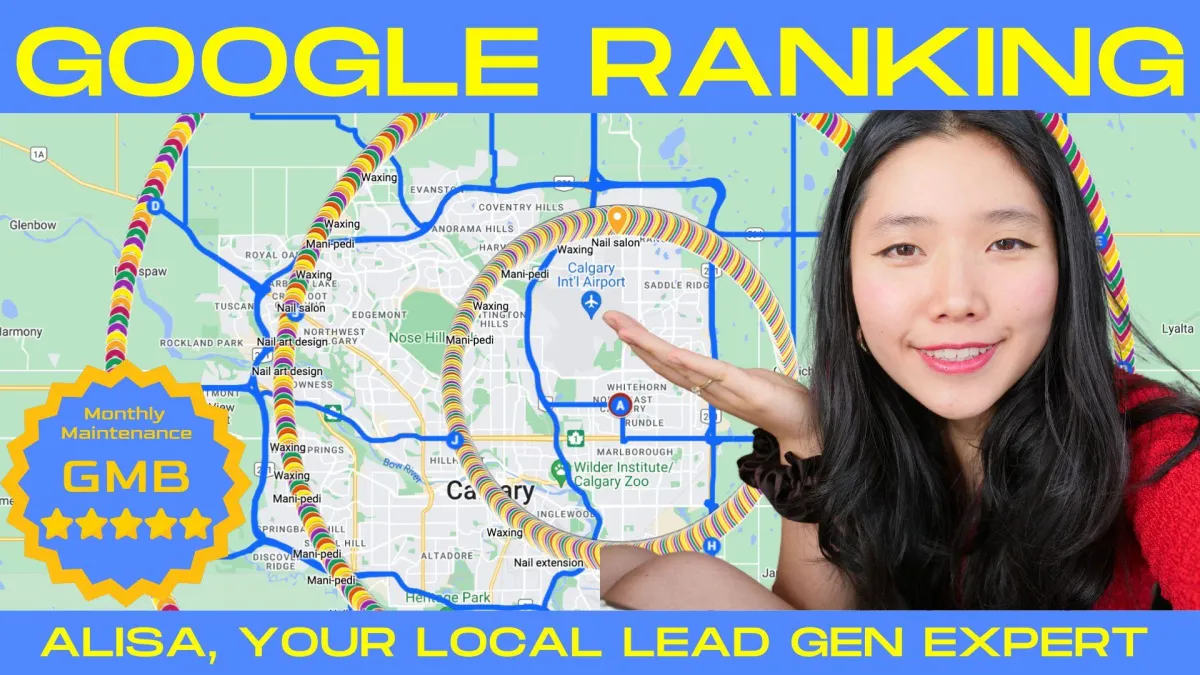Google My Business SEO
Google My Business SEO is a life-time investment for your Google Ranking
What are Google My Business?
Google My Business (GMB)is a free tool provided by Google that helps businesses manage their online presence across Google’s platform, including Google Search and Google Maps. It allows businesses to control how they appear when customers search for them online, making it easier for potential customers to find, learn about, and interact with your business.
Key Features of Google My Business :
Business Profile: Name, Address, Phone Number (NAP): You can update and verify your business name, address, phone number, and business hours to ensure customers can reach you easily.Business
Description:
You can write a brief summary about your business and what services you offer.Business
Categories:
You can select relevant categories that describe your business, helping Google show your business in relevant searches.Photos and
Videos:
Upload high-quality photos and videos to showcase your business, products, or services. This helps improve your visibility and engagement with potential customers.You can add interior, exterior, product, and staff photos, giving customers a sense of your business.
Customer Reviews and Ratings:
Customers can leave reviews about your business, which appear in your profile.You can respond to customer reviews, showing engagement and improving your relationship with customers.Positive reviews can improve your credibility and reputation online.Google Maps Integration:Your business will appear on Google Maps, making it easier for customers to find your physical location and get directions.Map
Pack: Google’s local search results often include a map of businesses that match your query. GMB helps ensure you appear in these search results.Insights and Analytics:Google My Business provides data about how customers find your business, including:How they searched (e.g., through direct search or via Google Maps)Where they found your business (e.g., search engine, maps, etc.)Actions taken (e.g., calls, website visits, direction requests)These insights help you understand customer behavior and optimize your profile.Appointment Booking and Messaging:Businesses that accept appointments or bookings can integrate scheduling software, allowing customers to book directly from the GMB profile.Customers can also message your business directly through Google.Posts:You can create Google Posts to share updates, offers, events, or news directly on your profile.These posts appear in your Google listing and can encourage customer engagement.
Why Google My Business is Important:
Improves Local SEO:GMB is an essential part of Local SEO (Search Engine Optimization), helping your business appear in local search results. If someone searches for businesses near them (e.g., "photographer near me"), having an optimized GMB profile improves the chances of appearing in search results.Increases Visibility:With a well-maintained GMB profile, your business can show up in Google’s Local Pack, Map Pack, and organic search results, increasing your chances of getting discovered by potential customers.Engages Customers:Reviews, photos, and posts make your profile more engaging and informative, increasing the likelihood of users reaching out or visiting your business.Helps with Customer Trust:A complete and regularly updated Google My Business profile gives customers confidence that your business is legitimate and trustworthy.
How to Get Started with Google My Business :
Create or Claim Your Business Profile:If you haven't done so already, go to Google My Business and create an account or claim your business.Verify Your Business:Google will ask you to verify your business, usually by sending a postcard with a verification code to your business address.Fill in Your Information:Add details like your business hours, contact information, website, and a brief description of your services.Add Photos:Upload images that represent your business. High-quality images of your location, products, or services are essential for engaging potential customers.Keep Your Profile Updated:Regularly update your hours, special offers, and any changes to your services. Respond to reviews and posts.
Common Mistakes to Avoid:
Inaccurate Information:Always make sure your business information (address, phone number, etc.) is accurate. Inconsistent information can hurt your local SEO and confuse potential customers.Ignoring Reviews:Failing to respond to reviews (both positive and negative) can make your business seem unengaged. Responding shows that you care about feedback.Not Uploading Photos:A profile without photos can look incomplete or unprofessional. Always upload quality photos to attract customers.Not Keeping Your Business Hours Updated:Especially during holidays or special events, update your hours so customers don’t show up when you’re closed.
🏆Successful Case-Studies🏆

Ad Management Packages


Dominate Your Local Google Map Ranking?
AD SPEND = Is not money that will be going to our agency, but it will be going directly to Meta and Google platforms in order for our ads to be shown.
N I C H E S
STEM Academies
Dentals
Medspas & Botox
Ecommerce
Cybersecurity
Defi & Finances
View Ad Ideas & Examples

How to Align Business Goals with Digital Advertising Campaigns
Everything You Need to Know:
Why is aligning business goals with digital advertising so crucial?
When you connect your digital ad strategy to real business objectives, every campaign is purposeful. This alignment turns ad budgets into measurable growth—whether you want sales, leads, awareness, or engagement.How do I set clear goals for my digital campaigns?
Easy: use the SMART method. Goals should be Specific, Measurable, Achievable, Relevant, and Time-bound. Instead of “get more traffic,” aim for “increase qualified leads by 30% in Q3.”How does audience targeting impact alignment with business goals?
Knowing your customers ensures your budget reaches people most likely to convert. Tailor campaigns using buyer personas and segmentation for higher relevance and ROI.How often should I optimize my digital ad campaigns?
Always optimize! Review data weekly or monthly—pivot when needed. Continuous monitoring means your tactics stay synced with shifting business priorities.Can working with a digital agency help?
Absolutely. Partner agencies bring fresh perspective, strategic expertise, and can quickly adjust campaigns to deliver on your business KPIs.
Why Alignment Matters?
Imagine running digital ads with no clear link to your company’s core goals—wasted money, missed opportunities. The secret to successful digital advertising is simple but powerful: direct every campaign to move your business forward. Proper alignment means your investment fuels growth, boosts brand equity, or drives real conversions.
In this blog, you’ll discover how to connect business strategy with digital ad campaigns, ensuring maximum impact and continuous growth.
Step 1: Define Crystal-Clear Business Goals
Use the SMART Framework
Specific: “Grow email subscribers,” not just “boost engagement.”
Measurable: Add a number—“by 25% in 6 months.”
Achievable: Ground goals in reality, based on trends and resources.
Relevant: Tie campaigns directly to business needs—like sales, leads, or retention.
Time-bound: Give every goal a clear deadline.
Map Out Short-Term vs. Long-Term Aims
Short-term: Flash sales, event registrations, lead generation.
Long-term: Market share growth, loyalty programs, new market penetration.
Choose KPIs That Matter
Sales growth
Customer acquisition cost (CAC)
Return on ad spend (ROAS)
Average order value
Conversion rate
Brand awareness metrics
Step 2: Get to Know Your Ideal Audience
Build Rich Buyer Personas
Demographics: Age, gender, job title, location.
Psychographics: Values, interests, pain points.
Behavioral Data: Past purchases, website actions, email opens.
Segment for Precision
New visitors vs. return customers
Users who abandoned carts
High-value vs. occasional buyers
Analyze and Refine
Leverage analytics tools to uncover patterns, tweak personas, and personalize your messaging.
Step 3: Align Advertising Strategies with Your Goals
Pick the Right Platforms
Craft Messaging That Matches Objectives
For sales: Strong CTAs, benefits, urgency.
For awareness: Storytelling, brand values, memorable imagery.
For retention: Loyalty offers, personalized recommendations.
Match Budget to Priority
Put more into tactics proven to move needles for your business KPIs. Keep some budget for testing novel approaches.
Step 4: Optimize Using Data
Set Up Real-Time Dashboards
Use platforms like Google Analytics or Data Studio to monitor KPI progress and campaign health.
Embrace A/B Testing
Never assume—test headlines, images, calls-to-action. Let the data decide winners.
Continuously Collaborate
Meet regularly with your team (or agency) to share reports, brainstorm fresh angles, and identify improvement areas.
Step 5: Geo-Enhancement—Go Local, Win Big
Geo-Target Your Campaigns
Customize campaigns for city, region, or country.
Localize copy, visuals, and offers.
Combine Local SEO with Paid Ads
Bid on location-based keywords.
Optimize Google Business Profiles.
Monitor Geo-Specific Results
Track KPIs by geography. Scale what works, cut what doesn’t.
Summary: Put It All Together
Aligning business goals and digital advertising is the cornerstone of results-driven marketing. Set SMART, relevant goals. Understand and segment your audience deeply. Choose the channels and messages best matched to your objectives. Optimize everything based on analytics. Go local for added relevance and impact.
When you connect these dots—and revisit your strategy periodically—your ad spend delivers real, ongoing business growth.
Ready to Grow? Take Action Now
Want a custom strategy that tightly aligns your business goals with high-ROI digital ad campaigns? Contact our team of digital marketing experts today for a free consultation. Let’s create campaigns that power up your bottom line!
👇Get In Touch👇
Email: [email protected]
Address
Vancouver, British Columbia, Canada
☎️ Phone Number
778-680-7206
Insta: @monalisa_inunderground
@alisaadshow
💡Other Projects:💡
ZADKA Clothes + Quotes = IMPACT
MonAlisa Maternity Maternity Marketing Agency
Canadian Neighbours Canadian Neighbours
Let's Cold Call Polite but Aggressive Female Cold Calling Agency. www.letscoldcall.agency. @letscoldcall

Copyright 2025. All rights reserved
Watch My Youtube Videos!
John Doe
Check out My Content

How to Align Business Goals with Digital Advertising Campaigns
Everything You Need to Know:
Why is aligning business goals with digital advertising so crucial?
When you connect your digital ad strategy to real business objectives, every campaign is purposeful. This alignment turns ad budgets into measurable growth—whether you want sales, leads, awareness, or engagement.How do I set clear goals for my digital campaigns?
Easy: use the SMART method. Goals should be Specific, Measurable, Achievable, Relevant, and Time-bound. Instead of “get more traffic,” aim for “increase qualified leads by 30% in Q3.”How does audience targeting impact alignment with business goals?
Knowing your customers ensures your budget reaches people most likely to convert. Tailor campaigns using buyer personas and segmentation for higher relevance and ROI.How often should I optimize my digital ad campaigns?
Always optimize! Review data weekly or monthly—pivot when needed. Continuous monitoring means your tactics stay synced with shifting business priorities.Can working with a digital agency help?
Absolutely. Partner agencies bring fresh perspective, strategic expertise, and can quickly adjust campaigns to deliver on your business KPIs.
Why Alignment Matters?
Imagine running digital ads with no clear link to your company’s core goals—wasted money, missed opportunities. The secret to successful digital advertising is simple but powerful: direct every campaign to move your business forward. Proper alignment means your investment fuels growth, boosts brand equity, or drives real conversions.
In this blog, you’ll discover how to connect business strategy with digital ad campaigns, ensuring maximum impact and continuous growth.
Step 1: Define Crystal-Clear Business Goals
Use the SMART Framework
Specific: “Grow email subscribers,” not just “boost engagement.”
Measurable: Add a number—“by 25% in 6 months.”
Achievable: Ground goals in reality, based on trends and resources.
Relevant: Tie campaigns directly to business needs—like sales, leads, or retention.
Time-bound: Give every goal a clear deadline.
Map Out Short-Term vs. Long-Term Aims
Short-term: Flash sales, event registrations, lead generation.
Long-term: Market share growth, loyalty programs, new market penetration.
Choose KPIs That Matter
Sales growth
Customer acquisition cost (CAC)
Return on ad spend (ROAS)
Average order value
Conversion rate
Brand awareness metrics
Step 2: Get to Know Your Ideal Audience
Build Rich Buyer Personas
Demographics: Age, gender, job title, location.
Psychographics: Values, interests, pain points.
Behavioral Data: Past purchases, website actions, email opens.
Segment for Precision
New visitors vs. return customers
Users who abandoned carts
High-value vs. occasional buyers
Analyze and Refine
Leverage analytics tools to uncover patterns, tweak personas, and personalize your messaging.
Step 3: Align Advertising Strategies with Your Goals
Pick the Right Platforms
Craft Messaging That Matches Objectives
For sales: Strong CTAs, benefits, urgency.
For awareness: Storytelling, brand values, memorable imagery.
For retention: Loyalty offers, personalized recommendations.
Match Budget to Priority
Put more into tactics proven to move needles for your business KPIs. Keep some budget for testing novel approaches.
Step 4: Optimize Using Data
Set Up Real-Time Dashboards
Use platforms like Google Analytics or Data Studio to monitor KPI progress and campaign health.
Embrace A/B Testing
Never assume—test headlines, images, calls-to-action. Let the data decide winners.
Continuously Collaborate
Meet regularly with your team (or agency) to share reports, brainstorm fresh angles, and identify improvement areas.
Step 5: Geo-Enhancement—Go Local, Win Big
Geo-Target Your Campaigns
Customize campaigns for city, region, or country.
Localize copy, visuals, and offers.
Combine Local SEO with Paid Ads
Bid on location-based keywords.
Optimize Google Business Profiles.
Monitor Geo-Specific Results
Track KPIs by geography. Scale what works, cut what doesn’t.
Summary: Put It All Together
Aligning business goals and digital advertising is the cornerstone of results-driven marketing. Set SMART, relevant goals. Understand and segment your audience deeply. Choose the channels and messages best matched to your objectives. Optimize everything based on analytics. Go local for added relevance and impact.
When you connect these dots—and revisit your strategy periodically—your ad spend delivers real, ongoing business growth.
Ready to Grow? Take Action Now
Want a custom strategy that tightly aligns your business goals with high-ROI digital ad campaigns? Contact our team of digital marketing experts today for a free consultation. Let’s create campaigns that power up your bottom line!

How to Align Business Goals with Digital Advertising Campaigns
Everything You Need to Know:
Why is aligning business goals with digital advertising so crucial?
When you connect your digital ad strategy to real business objectives, every campaign is purposeful. This alignment turns ad budgets into measurable growth—whether you want sales, leads, awareness, or engagement.How do I set clear goals for my digital campaigns?
Easy: use the SMART method. Goals should be Specific, Measurable, Achievable, Relevant, and Time-bound. Instead of “get more traffic,” aim for “increase qualified leads by 30% in Q3.”How does audience targeting impact alignment with business goals?
Knowing your customers ensures your budget reaches people most likely to convert. Tailor campaigns using buyer personas and segmentation for higher relevance and ROI.How often should I optimize my digital ad campaigns?
Always optimize! Review data weekly or monthly—pivot when needed. Continuous monitoring means your tactics stay synced with shifting business priorities.Can working with a digital agency help?
Absolutely. Partner agencies bring fresh perspective, strategic expertise, and can quickly adjust campaigns to deliver on your business KPIs.
Why Alignment Matters?
Imagine running digital ads with no clear link to your company’s core goals—wasted money, missed opportunities. The secret to successful digital advertising is simple but powerful: direct every campaign to move your business forward. Proper alignment means your investment fuels growth, boosts brand equity, or drives real conversions.
In this blog, you’ll discover how to connect business strategy with digital ad campaigns, ensuring maximum impact and continuous growth.
Step 1: Define Crystal-Clear Business Goals
Use the SMART Framework
Specific: “Grow email subscribers,” not just “boost engagement.”
Measurable: Add a number—“by 25% in 6 months.”
Achievable: Ground goals in reality, based on trends and resources.
Relevant: Tie campaigns directly to business needs—like sales, leads, or retention.
Time-bound: Give every goal a clear deadline.
Map Out Short-Term vs. Long-Term Aims
Short-term: Flash sales, event registrations, lead generation.
Long-term: Market share growth, loyalty programs, new market penetration.
Choose KPIs That Matter
Sales growth
Customer acquisition cost (CAC)
Return on ad spend (ROAS)
Average order value
Conversion rate
Brand awareness metrics
Step 2: Get to Know Your Ideal Audience
Build Rich Buyer Personas
Demographics: Age, gender, job title, location.
Psychographics: Values, interests, pain points.
Behavioral Data: Past purchases, website actions, email opens.
Segment for Precision
New visitors vs. return customers
Users who abandoned carts
High-value vs. occasional buyers
Analyze and Refine
Leverage analytics tools to uncover patterns, tweak personas, and personalize your messaging.
Step 3: Align Advertising Strategies with Your Goals
Pick the Right Platforms
Craft Messaging That Matches Objectives
For sales: Strong CTAs, benefits, urgency.
For awareness: Storytelling, brand values, memorable imagery.
For retention: Loyalty offers, personalized recommendations.
Match Budget to Priority
Put more into tactics proven to move needles for your business KPIs. Keep some budget for testing novel approaches.
Step 4: Optimize Using Data
Set Up Real-Time Dashboards
Use platforms like Google Analytics or Data Studio to monitor KPI progress and campaign health.
Embrace A/B Testing
Never assume—test headlines, images, calls-to-action. Let the data decide winners.
Continuously Collaborate
Meet regularly with your team (or agency) to share reports, brainstorm fresh angles, and identify improvement areas.
Step 5: Geo-Enhancement—Go Local, Win Big
Geo-Target Your Campaigns
Customize campaigns for city, region, or country.
Localize copy, visuals, and offers.
Combine Local SEO with Paid Ads
Bid on location-based keywords.
Optimize Google Business Profiles.
Monitor Geo-Specific Results
Track KPIs by geography. Scale what works, cut what doesn’t.
Summary: Put It All Together
Aligning business goals and digital advertising is the cornerstone of results-driven marketing. Set SMART, relevant goals. Understand and segment your audience deeply. Choose the channels and messages best matched to your objectives. Optimize everything based on analytics. Go local for added relevance and impact.
When you connect these dots—and revisit your strategy periodically—your ad spend delivers real, ongoing business growth.
Ready to Grow? Take Action Now
Want a custom strategy that tightly aligns your business goals with high-ROI digital ad campaigns? Contact our team of digital marketing experts today for a free consultation. Let’s create campaigns that power up your bottom line!
Successes Case Project
More Alisa's Brand

Competition & Attorney
Financial

Giving Million Air Wings
Violence

Car Accident Insurance
Founder

ZADKA
